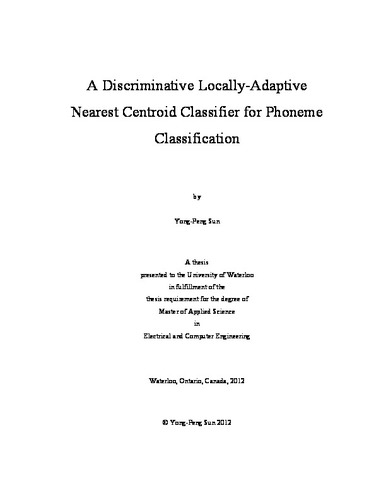| dc.contributor.author | Sun, Yong-Peng | |
| dc.date.accessioned | 2012-08-31 20:07:48 (GMT) | |
| dc.date.available | 2012-08-31 20:07:48 (GMT) | |
| dc.date.issued | 2012-08-31T20:07:48Z | |
| dc.date.submitted | 2012 | |
| dc.identifier.uri | http://hdl.handle.net/10012/6968 | |
| dc.description.abstract | Phoneme classification is a key area of speech recognition. Phonemes are the basic modeling units in modern speech recognition and they are the constructive units of words. Thus, being able to quickly and accurately classify phonemes that are input to a speech-recognition system is a basic and important step towards improving and eventually perfecting speech recognition as a whole.
Many classification approaches currently exist that can be applied to the task of classifying phonemes. These techniques range from simple ones such as the nearest centroid classifier to complex ones such as support vector machine. Amongst the existing classifiers, the simpler ones tend to be quicker to train but have lower accuracy, whereas the more complex ones tend to be higher in accuracy but are slower to train. Because phoneme classification involves very large datasets, it is desirable to have classifiers that are both quick to train and are high in accuracy. The formulation of such classifiers is still an active ongoing research topic in phoneme classification. One paradigm in formulating such classifiers attempts to increase the accuracies of the simpler classifiers with minimal sacrifice to their running times. The opposite paradigm attempts to increase the training speeds of the more complex classifiers with minimal sacrifice to their accuracies.
The objective of this research is to develop a new centroid-based classifier that builds upon the simpler nearest centroid classifier by incorporating a new discriminative locally-adaptive training procedure developed from recent advances in machine learning. This new classifier, which is referred to as the discriminative locally-adaptive nearest centroid (DLANC) classifier, achieves much higher accuracies as compared to the nearest centroid classifier whilst having a relatively low computational complexity and being able to scale up to very large datasets. | en |
| dc.language.iso | en | en |
| dc.publisher | University of Waterloo | en |
| dc.subject | classifier | en |
| dc.subject | speech recognition | en |
| dc.title | A Discriminative Locally-Adaptive Nearest Centroid Classifier for Phoneme Classification | en |
| dc.type | Master Thesis | en |
| dc.pending | false | en |
| dc.subject.program | Electrical and Computer Engineering | en |
| uws-etd.degree.department | Electrical and Computer Engineering | en |
| uws-etd.degree | Master of Applied Science | en |
| uws.typeOfResource | Text | en |
| uws.peerReviewStatus | Unreviewed | en |
| uws.scholarLevel | Graduate | en |

